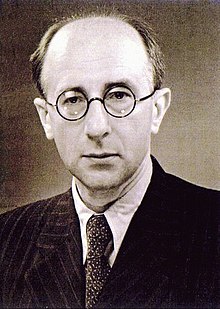Wilhelm Riemschneider (philologist)
Wilhelm Riemschneider (born January 26, 1896 in Rutzau , Latvia, † December 10, 1942 in Berlin ) was a German classical philologist.
Life
Wilhelm Riemschneider, the son of the doctor Johannes Riemschneider, attended the Waltersche German private grammar school in Dorpat from 1909 to 1913 and in May 1914 passed the school leaving examination at the grammar school of the Historical-Philological Institute in St. Petersburg. He studied at the Russian University of Jurjew (Dorpat) during the First World War . During the occupation of Latvia by the German army in the spring of 1918, he volunteered for military service as a German patriot. He was hired in the fall, but never returned to the field. From July 1919 to January 1920 he served in the German Reichswehr and then acquired German citizenship.
In the winter semester of 1919/1920, Riemschneider began studying Classical Philology , Slavic Studies and Theater Studies at the Friedrich Wilhelms University . His academic teachers included Hermann Diels , Ulrich von Wilamowitz-Moellendorff , Karl Deichgräber , Wilhelm Schulze , Ferdinand Noack , Otto Regenbogen , Werner Jaeger and Ludwig Deubner .
Riemschneider was a member of the philological seminar for two semesters and a senior in the second semester. Due to a serious illness he had to drop out of his studies and was unable to continue for years. With the support of Ludwig Deubner and Johannes Stroux , he achieved his doctorate in 1940 after the oral examination had already taken place in 1938.
His dissertation The unit of Euripides Phönissen published in 1940 in a revised version under the title hero and state in Euripides' Phoenissen (Würzburg: Triltsch). Riemschneider dealt with the problem of the composition of the Phoenissen , whose disparate appearance led the philologists either to a separation into individual episodes or to disparaging judgments about the poetic technique of the poet. Riemschneider stood up for the unity of the piece and saw the main motif of the piece in the protection of the polis . This view was rejected by Albin Lesky .
On December 10, 1942, Riemschneider died after a brief illness. Most recently he worked for the Corpus Inscriptionum Latinarum at the Prussian Academy of Sciences , for which he had created the indexes for volumes VIII and XIII.
In addition to his widely acclaimed dissertation (reviews appeared in the journals Classical Philology , 1943 and Gnomon , 1944), Riemschneider wrote essays for the journals Janus and Hermes as well as articles for Paulys Realencyclopädie der Classischen Antiquity .
literature
- Curriculum vitae in his dissertation: The Unity of the Euripidean Phönissen (Würzburg 1940), after p. 54
Web links
Individual evidence
- ↑ Yearbook of the Prussian Academy of Sciences , Berlin 1942, p. 57
| personal data | |
|---|---|
| SURNAME | Riemschneider, Wilhelm |
| ALTERNATIVE NAMES | Riemschneider, Wilhelm Friedrich Karl |
| BRIEF DESCRIPTION | German classical philologist |
| DATE OF BIRTH | January 26, 1896 |
| PLACE OF BIRTH | Rutzau |
| DATE OF DEATH | December 10, 1942 |
| Place of death | Berlin |
